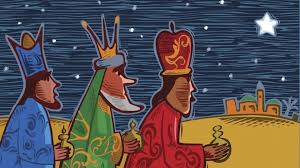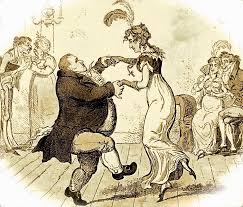
The Six Wise Men
I’m sure you’ve heard the gospel story of the “three wise men,” sometimes called “the three kings” or the “magi.” Most Scripture scholars believe the writer of the Gospel of Matthew uses this mythical story to convey Jesus’ divine and messianic stature, and the wise men “from the East” are thought to signify that gentiles as well as Jews will honor Jesus’ divinity.
Although the story of the wise men has become part of the Christmas story, they are traditionally celebrated in western Christianity on Jan. 6, on what is called the Feast of the Epiphany, the revelation of Jesus as God-become-human.
Though the number isn’t specified in the gospel, there are said to be three wise men because they brought three gifts to the infant Jesus. But did you know there were actually six?
Me, neither.
Tongue-in-Cheek
But that’s part of an on-line homily of Padre Santiago Martín, a Spanish Franciscan, on the subject. He says so “tongue-in-cheek” to make a point. He points out that the traditional names given to the wise men are Gaspar, Balthasar, and Melchior – names more familiar to Hispanic Catholics than to other Christians. He names the other three “A, B and C.”
And inMartín’s story about the gospel’s infancy narrative, Gaspar, Balthasar and Melchior have a discussion with A, B and C in their home country, thought to be Babylonia. The discussion is about whether or not they should “follow the star” and make the trek to Bethlehem to find the child who would be “king of the Jews.”
First, A says he’s not going because it can’t be demonstrated that the infant exists and if so, is significant.
But, says Melchior, “If you’re wise, like you think you are, but think you shouldn’t take risks, how will you ever learn anything? And if everything in this life has to be demonstrated, how can you love anybody. I’m going, and if I’m wrong, what do I have to lose except a trip?”
Visiting Professor from Africa
Then Balthasar, who Martín comically identifies as “a visiting professor from Africa (One of the wise men is traditionally depicted as African.) at the University of Babylonia, discusses the trip with B. B says he’s tired, and it’s uncertain where the star that the three wise men intended to follow would take them.
Besides, he adds, “The Jews are dangerous and have a weird religion. I’m not going.”
Balthasar says that not only is he going but he intends to take a gift of gold. “As a native of Africa, where there’s a lot of poverty, I understand that sometimes people need help. You other wise men may not understand this, but as an African, I do.”
Finally, Gaspar discusses the trip with C, who says he recently lost his son, who was “his future, his hope,” and that he was in a crisis of faith.
A Lot to Lose
“I understand what a loss you’ve had,” replies Gaspar. “I too have recently lost a loved one but the Jews (according to the stories the wise men have heard) say this infant will be the savior of the world. By not going, you have a lot to lose and by going, I have a lot to gain.”
The wise men make the trip, return to Babylonia and are asked what they discovered.
Says Melchior, “I took a risk … and discovered what I wasn’t expecting: that there is a God, who is love, and that he became love in the guise of a baby. Now, I have no doubt but certainty.” The other two had similar responses.
The moral of this story, says Padre Santiago, is that “if you don’t take risks because you consider yourself wise, you have a lot to lose. And if you don’t love, you’ve condemned yourself to solitude. You may not want to go to church because of the ‘lame homilies and the antiquated rules,’ but if you don’t take a risk, you can’t have hope. And hope gives us strength in troubled times.”


